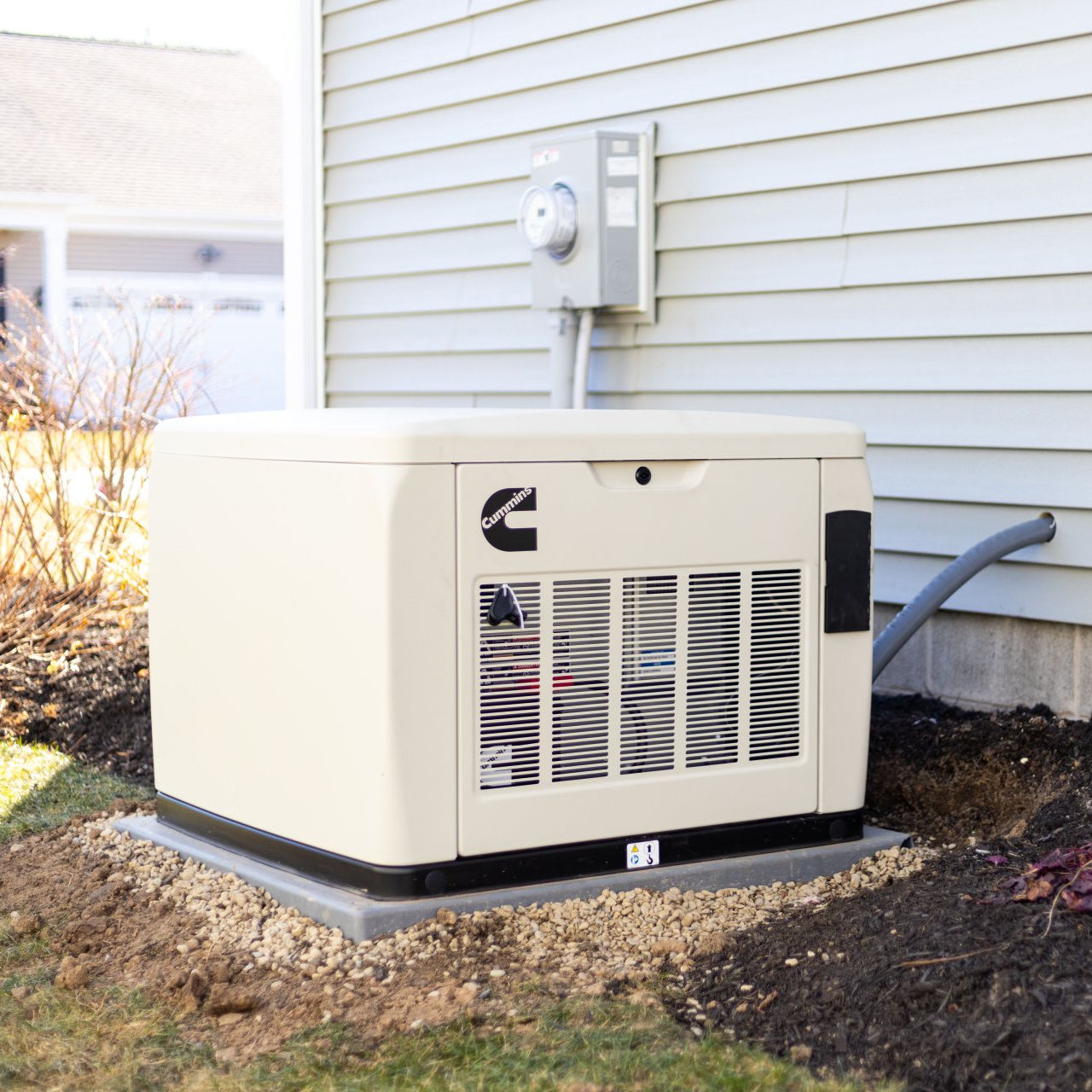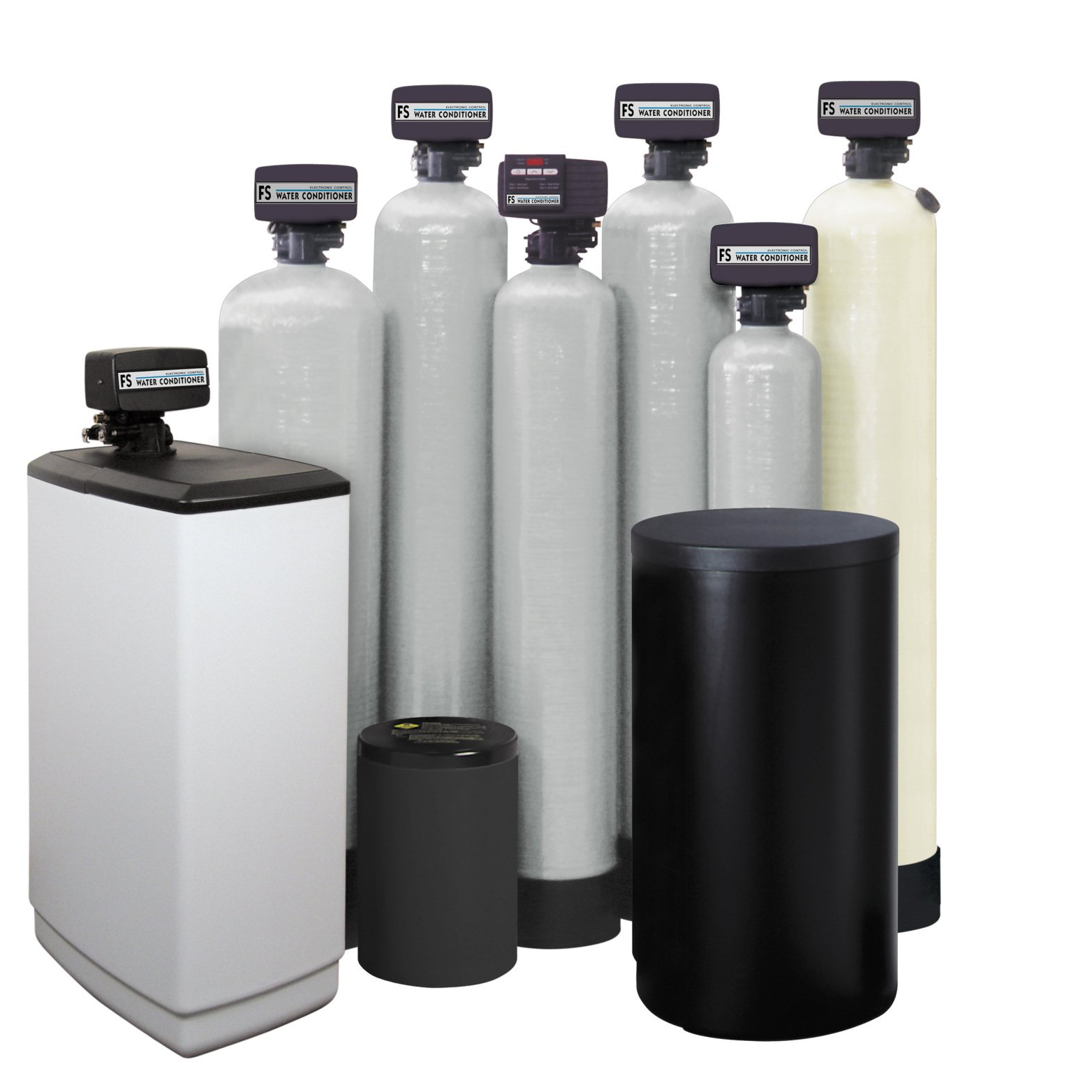Water Softeners,
Schenectady NY
Schenectady, NY
Softer Water
Free Water Tests
Water Quality Testing and Treatment, Schenectady NY
Purification Systems, Large and Small
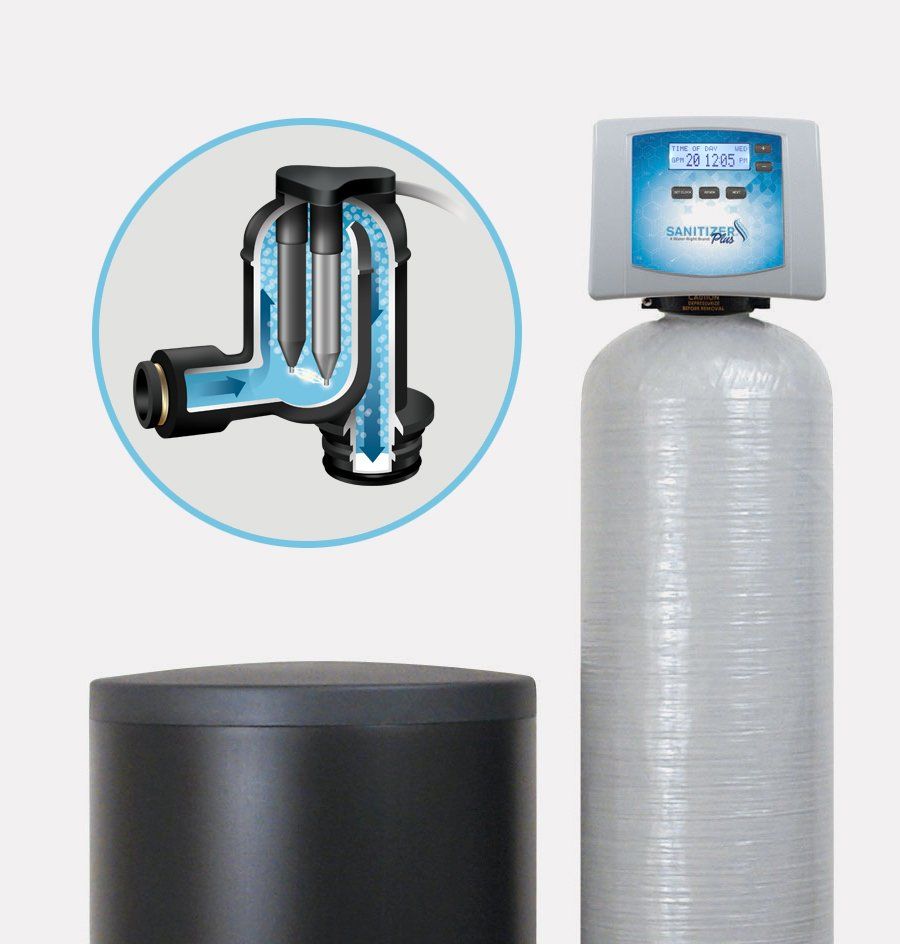
Sanitizer Plus
Sanitizer Plus Series® water treatment systems combine patented self-chlorinating technology* with advanced electronics to perform like four units in one – softening, removing iron and manganese, and raising low pH levels. This advanced system also controls odors caused by nuisance bacteria and minor sulfur conditions. Watch how it works!
- Exclusive Crystal-Right to remove hardness, iron, and manganese, plus it corrects low pH and control odor
- Patented self-chlorinating technology* for bacteria odor control
- Single unit operation — no chemicals or added equipment
- Visual and audible “Check Salt” indicator
- Extended lithium battery backup
- Overrun capacity protection
- Flexible “adjustable cycle sequence” programming — saves salt and water
- Advanced history and diagnostic screens
- Features an optional weather cover for outdoor installations
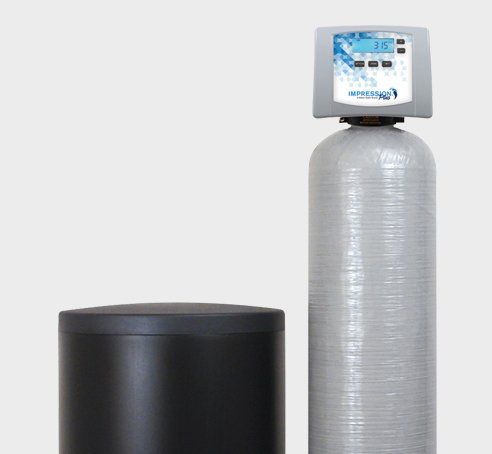
Impression Plus
Whether you need to treat hard municipal water or want a well water system, Impression Plus Series® water softeners deliver the clear, soft water you want and need. An easy-to-read, backlit LED screen and user-friendly console allow you to monitor all operating functions.
- NSF/ANSI 44 Tested and Certified
- Solid-state microprocessor control
- Top tank flange for easy servicing
- Meter monitors and self-adjusts regeneration cycles based on household trend of water consumption
- Easily programmed for optimum performance
- Backlit LED display
- Flexible “adjustable cycle sequence” programming — saves salt and water
- Advanced history and diagnostic screens and lithium battery backup
- Optional cabinet design offers excellent space savings

Impression Plus Tannin
Impression Plus® Tannin filtration systems are designed to effectively treat and remove tannins which can be found in well sources. Discoloration and stains on your fabrics will be a thing of the past.
The tannin filters use water efficiently — conserving your water supply and preserving your well and its components. A tannin system can provide the quality water you want without all the unwanted minerals, discoloration, odors, tastes or acidity.
System Features:
- Meter monitors and self-adjusts regeneration cycles based on household trend of water consumption
- Backlit LED display
- Top tank flange for easy servicing
- Advanced history, diagnostic screens, and lithium battery backup
- Efficient to operate
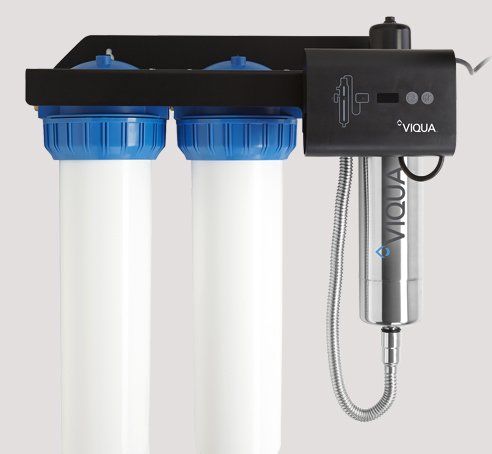
Viqua Home Plus™ Series
Viqua’s Home Plus Series UV water treatment systems are available when your drinking water requires additional home water filtration. These systems come equipped with sediment and carbon filters to help eliminate particles and reduce unpleasant odors and tastes.
- Protects against Cryptosporidium and Giardia, harmful bacteria like E. Coli and viruses not visible to the naked eye
- The system is easy to maintain and service
- Built with a durable stainless steel chamber to prolong life and eliminate ultraviolet light degradation
- Power supply visually displays the remaining lamp life and will alarm if the lamp fails to notify the homeowner
- The power supply has a sealed case to prevent damage from accidental water intrusion and is fully CSA and CE compliant
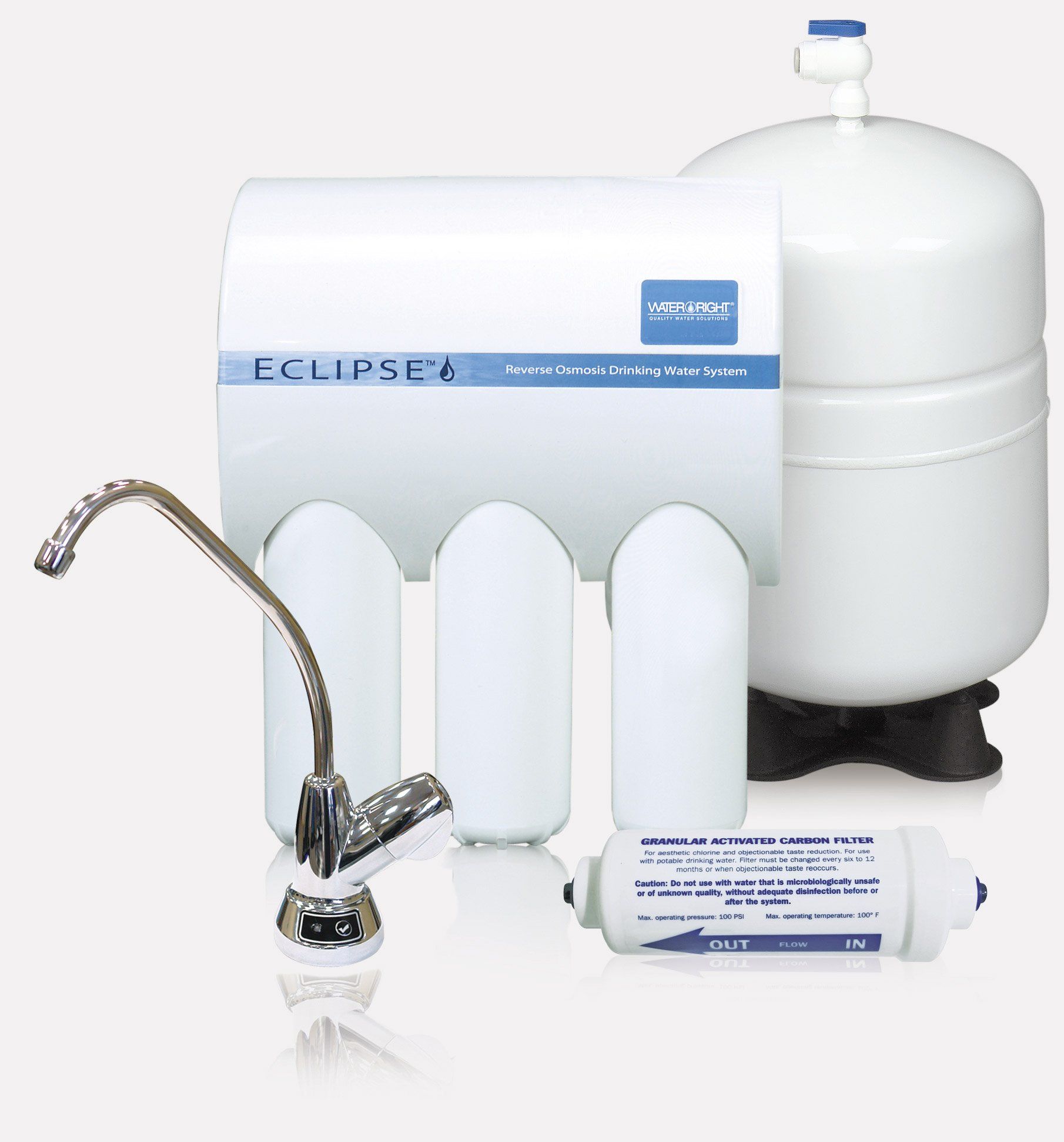
Eclipse R.O.
Nothing’s as refreshing as a glass of cool, clean water. A reliable residential water filtration system gives you and your family safe, clear water whenever it’s wanted.
- Reduce unwanted or harmful contaminants
- Get environmentally sound water treatment
- Indulge in cost-effective treatment compared to buying bottled water
- Savor the convenience of fresh, clean water
The Eclipse® R.O. drinking water filtration system is our top of the line RO system designed to provide your family with the cleanest, healthiest water possible. Multiple filters clean ordinary household water to reduce unwanted and harmful contaminants.
System performance is verified with a touch monitor on the system’s faucet base. Installation of a whole house water purification system is simple — no electricity needed.
Common Questions About Water Treatment Systems
-
How can I improve the quality of water in my home?
- Get a water test, either from a service provider or a state lab. We offer this service to our customers for free. You can’t improve your water quality if you aren’t sure what your water quality is.
- Consult a professional on the minerals and bacteria in your water, and get quotes on treatment systems. Once you have a water test done and are able to better understand the conditions of your water, municipal or well, you’ll be able to get accurate recommendations.
- Choose a brand and service provider who are able to install the system best suited to your water conditions.
-
How long do whole house water filters last?
Projected lifespan of water filters for most systems varies pretty significantly, but the average expected lifetime for the actual filter is roughly a year, so replacing filters yearly is a safe decision. It is worth doing a bit of research on your system and the filter it uses to be more precise, some filters are recommended to be changed every 6 months, while some systems have filters that only need to be replaced every 2-4 years.
-
What are the most common forms of water treatment?
General water filters are certainly the most commonly used system in most residential settings, These systems come in all shapes and sizes and utilize everything from air filtration to sediment layers and carbon filters, all designed for different water conditions and treatment methods.
R.O. systems are also incredibly common and popular in residential homes, particularly for drinking water. R.O. systems have a membrane that purifies water as it passes through. These systems are often hooked up to a single faucet for drinking water.
UV systems have also increased in popularity in recent years, often paired with carbon filters and other systems for extensive purification. UV light is capable of eliminating an overwhelming majority of most microorganisms and bacteria without the addition of any chemicals being added in the treatment process.
-
What is the best water filtration method?
The “best” filtration method will always depend on your water conditions to a varying degree, but when it comes to getting the best drinking water, Reverse Osmosis systems are generally touted as the best option. These can be installed into specific faucets in your home so you’re only using it on the water you drink. The R.O. process is very extensive and involves multiple stages of filtration, which supplies the best possible drinking water.
-
What causes poor water supply?
Issues your water supply may face will vary depending on whether you get your water from a municipal supply or a private well. Municipal water conditions are generally maintained to a certain standard, while private wells are not. The region in which you live will also play a prominent role, since waterways and aquifers share much of the same water.
In New York, and the whole of the North East, there are a handful of common water issues to lookout for including: arsenic, iron, high acidity, salt, lead and chlorine. On top of those issues, you should be on the lookout for possible contaminant factors near your home with a potential for runoff, particularly for well water.
An example being, if you live close to a dump or a chemical factory of some sort, you might have cause for concern because of the potential for waste to find its way into the shared water aquifer. Flooding can also stir up waste and other chemicals and distribute them over long distances into water supplies, which does happen from time to time in Upstate New York.
-
How often do you change the salt in a water softener?
The frequency at which you will need to add salt to your softener is directly correlated to how much water you use, so a home with 6 people will be consuming a lot more salt than a home with 2 people. Generally you can expect to be adding salt monthly on the “high use” end and around 10 weeks on the “low use” end.
If you feel as though the rate at which you are consuming salt is too high it may be because of the quality of the salt or an issue with the water softener regeneration process. You may need to alter the frequency at which your system regenerates if you believe you’re having issues with salt consumption.
Keep in mind that some systems require potassium for maximum performance, although that is not generally the case.
-
When should I regenerate my water softener?
Regular regenerations are strongly recommended and should be done every few days in order for your water softener to work correctly, the need for regeneration also correlates to the amount of water you use, but generally you will want to recharge your unit every 2-4 days. This process is necessary for the resin bed to be refreshed, and is also what consumes salt over time.
-
What happens if you don’t regenerate your water softener?
If you do not allow your softener to regenerate or add salt to your tank it will begin to allow hard water to pass through the system, at which point it will no longer soften the water. This process will not necessarily damage your water softener, it will just cease to function properly. It is not recommended that you stop your softener from regenerating or let it run out of salt.
-
How long do water softeners last?
The average lifespan of a water softener is roughly 10-15 years. Near the end of its life you will probably notice a water softener becoming less efficient (using more salt) and performing worse as well. It may slowly reach the point where your water is hard again and you're noticing build up in your faucets along with other hard water indicators. At that point, your water softener will need to be replaced.
-
Do UV water purifiers kill viruses and bacteria?
UV is often considered to be the most effective method of killing waterborne microbes and bacteria. Most statistics point to a nearly 100% rate of effectiveness (99.99%) for eliminating bacteria. This water purification process requires no additional chemicals and uses very little energy.
Contact us
Locations:
2025 Brighton Henrietta Town Line Rd,
Rochester, NY 14623
16 Jupiter Lane, Suite 6
Village of Colonie, NY 12205
1051 S Main St. Suite 6
Elmira, NY 14904
3959 N Buffalo St. Suite 37
Orchard Park, NY 14127
493B Blue Eagle Ave.
Harrisburg, PA 17112
1392 Frey Rd
Pittsburgh, PA 15235
(412) 229-8089
1247 US-15
South Williamsport, PA 17702
1740-b Harmon Ave.
Columbus, OH 43223
(614) 928-9009
5600 Hudson Industrial Parkway #300
Hudson, OH 44236
(234) 602-1009
Emergency Services 24/7
Standard Business Hours;
Monday-Friday: 8:00AM - 4:00PM
Contact Information:
Syracuse Area - Oswego, Auburn, Ithaca, Cortland, Utica, Rome...
Buffalo Area - Lockport, Warsaw, Niagara Falls, Batavia, Albion...
Rochester Area - Geneseo, Canandaigua, Penfield, Waterloo...
Watertown Area - Lowville, Canton, Star Lake, Potsdam...
Binghamton Area - Elmira, Norwich, Watkins Glen, Bath, Belmont...
Albany Area - Troy, Schenectady, Schoharie, Ballston Spa, Hudson...
Williamsport Area - Wellsboro, Lock Haven, Bellefonte, Towanda...
Wilkes-Barre Area - Bloomsburg, Pottsville, Jim Thorpe, Scranton, Milford...
Harrisburg Area - Lebanon, Reading, Lancaster, York, Carlisle...
Pittsburgh Area - Washington, Greensburg, Beaver, Butler, Kittanning...
Columbus Area - Mount Vernon, New Albany, Lancaster, Delaware...
Cleveland Area - Beechwood, Euclid, Bowling Green, Avon Lake...


